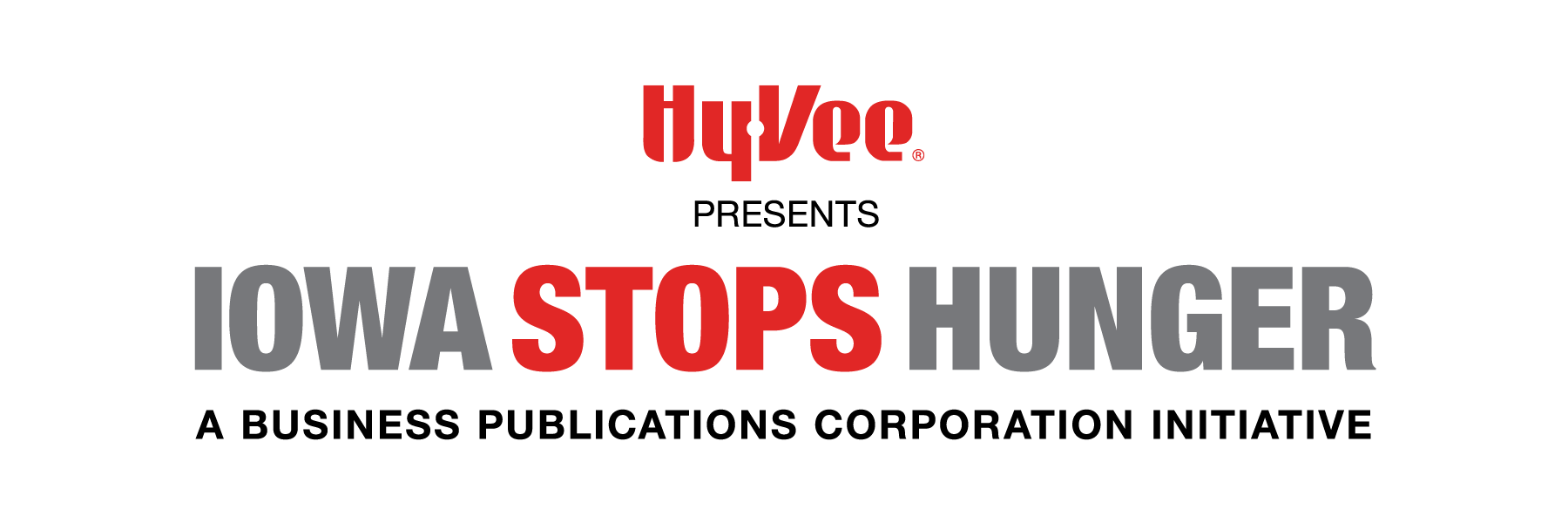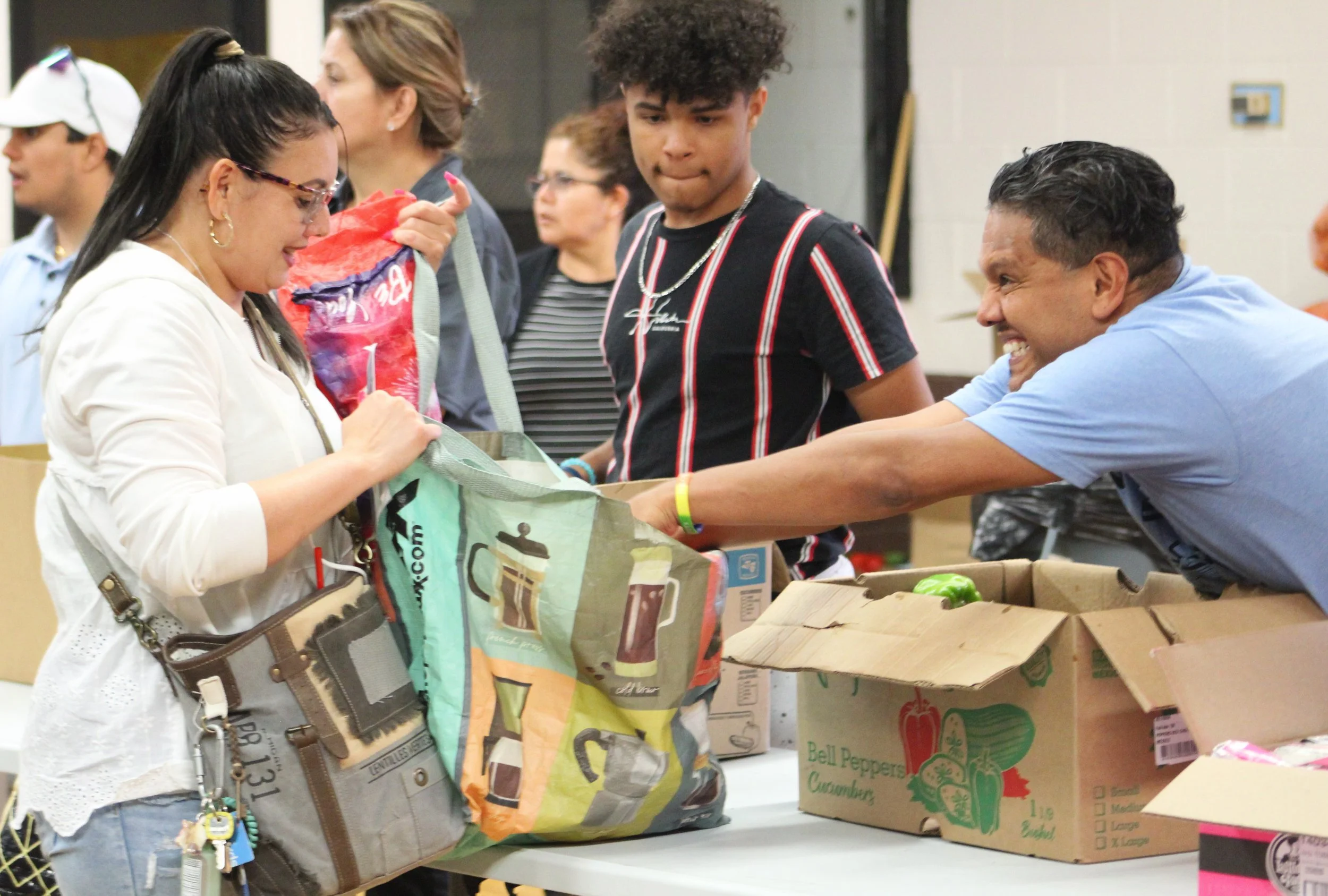Nelly Whitzer, left, receives food from Knock and Drop Iowa on May 22 at 4801 Franklin Ave. in Des Moines. Photo by Kyle Heim
Food pantries stressed to their limits as need for food assistance continues to rise
By Kyle Heim
Food banks and pantries across Iowa are struggling to keep pace with demand as the number of visitors seeking assistance continues to soar.
On March 27, Knock and Drop Iowa, a nonprofit serving the Latino community in Des Moines, provided food for 588 families during a 3 1/2-hour culturally specific hot-meal event at 4801 Franklin Ave.
A case of tomatoes that Zuli Garcia, chief executive director of the nonprofit, used to purchase for $5 to $10 when the pantry first opened in March 2020 now costs her between $20 and $26. She said serrano peppers have increased from $10 to $12 per case to about $35.
“It’s costing a lot of money to be able to put food on those families’ tables, especially because … it cost $5,900 for just one day, so imagine providing fresh produce for four to five Wednesdays a month,” Garcia said. “We only do it every Wednesday.”
Nelly Whitzer drives 45 minutes from Perry on Wednesdays to receive assistance for her family.
The single mother of three stays at home to care for her 3-year-old son, who has a tracheostomy tube.
A tracheostomy, also known as a tracheotomy, is an opening surgically created through the neck into the trachea to allow air to fill the lungs, according to Johns Hopkins Medicine. After creating the tracheostomy opening in the neck, surgeons insert a tube through it to provide an airway and to remove secretions from the lungs. The person with a tracheotomy breathes through the tracheostomy tube.
Whitzer receives supplemental security income for her two sons and was receiving child support for her 17-year-old daughter until May.
She has been relying on pantries to put enough food on the table to feed her children.
“I go wherever I can and get a little bit here, a little bit there, a little bit here, a little bit there,” she said. “And whatever I cannot get from any of those places, then it comes out of my pocket. That’s how it’s been since my [youngest] son was 6 months old.”
Whitzer, who suffers from asthma, migraines and low blood pressure, only recently qualified for Medicaid earlier this year. She had to wait a year without the medication she needed before becoming eligible and meeting the five-year resident status.
“I had to suffer and wait a year to get Medicaid in order to get my medications,” Whitzer said. “And during that whole entire time, I was only getting what I needed most; it was either my inhaler, my migraine medicine or my blood pressure medicine. I had to decide which one I needed the most that month. … Or there were times when people saw me doing that at the pharmacy and they felt so bad for me and they were paying for them. There were times when I took the [medications] one day but not the next, so they would last longer.
“I don’t even know how I survived all this time.”
Whitzer said she used to receive food assistance from the library in Perry until the program ended last summer.
“You don’t know how much that used to help people here in this town,” she said. “And the reason why they said they [ended it] was because they didn’t have anybody who could transport the food here to Perry, so we lost that. And when we used to have it, it was amazing because we used to get vegetables, we used to get fruit, we even got plants, we got flowers, we got bread, we got all kinds of things from the stores that they donated. We lost it because they didn’t have anybody else who could go pick it up and bring [it to Perry].”
Whitzer, along with hundreds of others, relies weekly on Knock and Drop Iowa to help fill the gap. The need for food assistance is growing across the entire state, causing additional strain on top of rising food costs for food banks and food pantries.
In April, Garcia joined about a dozen other leaders from anti-hunger organizations in writing a news release raising the alarm on worsening food insecurity in the state.
“When you have a child that’s telling you before we came to Knock and Drop, we ate our cereal with water, that should really hit you hard,” Garcia said.
The Des Moines Area Religious Council Food Pantry Network set a new record for the number of people it assisted in April, serving 25,209. The food pantry network served 14,394 in April 2022 and 10,319 in April 2021.
“The lines are getting longer,” said Michelle Book, president and CEO at Food Bank of Iowa. “Primarily, it’s young people with families who are working, but they can’t make ends meet. And then on the other side, it’s people living on fixed income — Medicare or disability — that can’t make ends meet. And so it’s this crunch.”
Common Good Iowa’s “9th Edition of the Cost of Living in Iowa” shows that 1 in 6 full-time Iowa workers earns income that falls short of affording a basic-needs budget. To meet basic needs, a single parent needs to earn at least $24.64 per hour.
Meanwhile, the median wage in Iowa in 2022 was $21.32, and a quarter of working Iowans still make less than $15.17 an hour.
“That’s a big difference,” Book said. “And that is the difference between whether they’re buying ramen noodles at the grocery store or they’re buying chicken breast and broccoli at the grocery store.”
As the calendar flips to the summer months, Garcia said it will be crucial for leaders to start thinking outside of the box when providing meals to families in need.
Specifically, she highlighted the importance of providing children with more than just one meal option at summer meal sites.
“I actually had a sponsor who … asked, ‘Would you be interested in doing a hot meal event in the summer for the children?’ What they hear a lot is that these [programs] are not being used,” Garcia said. “We need to start thinking outside the box and stop providing the same food all the time. We need to provide more culturally specific food.
“You need to think that some of these kids are not wanting that peanut butter and jelly sandwich, right? I mean, I might like a butter and jelly sandwich, but that doesn’t mean that all the children are used to eating a peanut butter and jelly sandwich. So I like the fact that the sponsor came to me and said, ‘You know, I really want to push some funds to Knock and Drop, so you can do a culturally specific hot meal during the summer for the kids.’”
After deciding not to participate in the Summer Electronic Benefits Transfer for Children — a program that provides families with children eligible for free or reduced-price school meals $40 per child per month during the summer to purchase food — Iowa Gov. Kim Reynolds created a $900,000 grant program that is funding 61 new free summer meal sites for Iowa children in low-income families.
By declining the Summer EBT, Reynolds turned down $29 million in federal funding, saying in a December 2023 news release that an EBT card does nothing to promote nutrition at a time when childhood obesity has become an epidemic.
“The thing is that when we are declining special funds that can help us, that is when it gets worse,” Garcia said. “We really need to step back and look at the people that are getting these types of services, that they actually need them, and you can’t just cut them off because you think that that is not needed. … This money is needed to be able to purchase the food because supposedly we’re doing the work, right? That was the answer. Well, the organizations are doing the work, right? But we can’t do the work if we don’t have the money, and it’s costing way more money.
“It’s not fair that someone all the way from Perry, Iowa, had to drive 45 minutes away, wasting gas and time, to be able to get a $25 gift card to be able to purchase milk for her special-needs child.”

